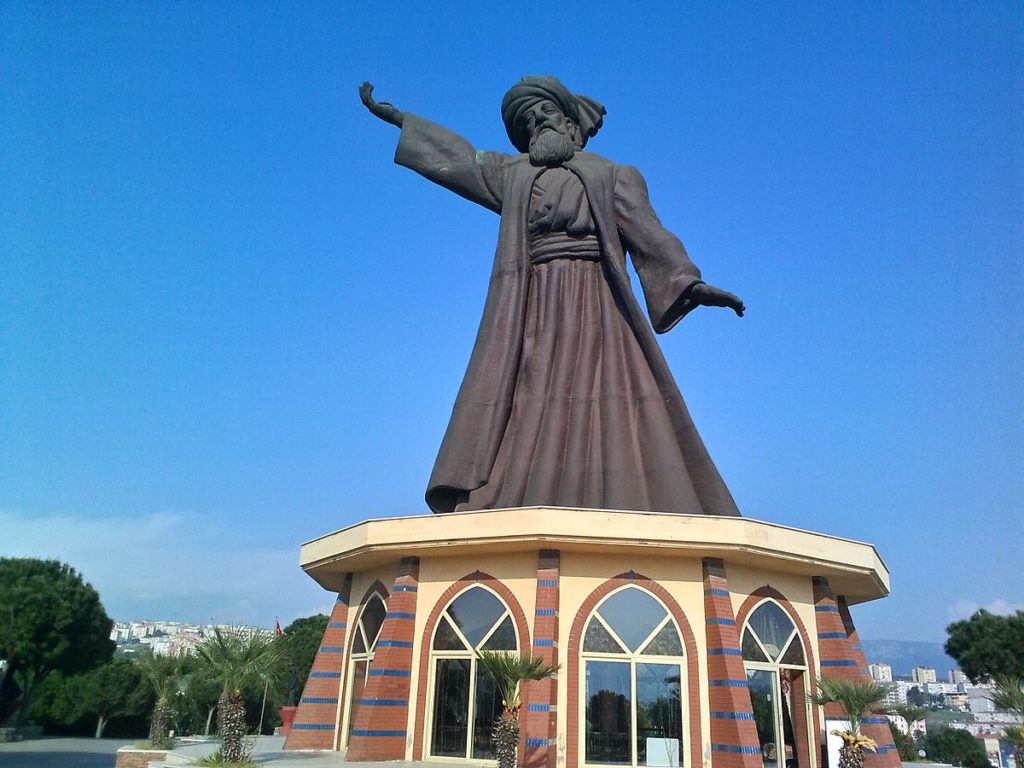Of all the threads that make up the tapestry of Afghanistan’s rich culture, poetry is one of the most important. The history of poetry in Afghanistan dates back thousands of years; even today, Afghans live and breathe poetry in a way that few other people do.
While Afghanistan has produced countless powerful and passionate poets over the centuries, none are more famous than Rumi. He was a 13th-century poet and theologian who continues to fascinate readers all over the world more than 700 years after his death.
There is some debate around which nation or country Rumi “belongs” to – his exact birthplace is not known, with some scholars saying it was in present-day Afghanistan and others claiming it was present-day Tajikistan. He also spent much of his life in in present-day Turkey. Regardless, Afghans have always held him in their hearts as their own beloved poet. Read on for fascinating facts about this legendary figure.

By İncelemeelemani – Own work, CC BY-SA 3.0, https://commons.wikimedia.org/w/index.php?curid=32889117
He came from a long line of preachers.
Rumi’s father and grandfather were both well-known Muslim preachers and Sunni jurists. Baha Valad, Rumi’s father, often led prayers at the local mosque, and was very disciplined about following religious rules and regulations. He was also deeply influenced by Sufism, the mystical branch of Islam that Rumi himself strongly identified with in his later years (in addition to his poetry, Rumi wrote several works of Sufi philosophy).
He reportedly saw angels as a boy.
After the poet’s death in 1273, many stories about his childhood and early life began to emerge, including the report that he had visions of angels as a small boy. While these episodes agitated the young Rumi, his father reassured him by saying that the angels appeared to him in order to offer favors. Many scholars view stories like these as a valuable clue to the interest in religion, spirituality, and poetic imagination that Rumi would become known for.
He spent much of his life away from his homeland.
Around the year 1210, Rumi’s father made the decision to move the family away from the town where Rumi was born, likely in response to the imminent invasion of Genghis Khan’s armies. After this move, Rumi never saw his homeland again.
Instead, he spent much of his life as a migrant, moving with his family through Uzbekistan, Iran, Syria, Saudi Arabia, and finally Turkey, where he lived for the last 50 years of his life. This experience exposed Rumi to a wide variety of languages and religious traditions. It also contributed to his embrace of the impermanence of things, which is reflected in much of his poetry.
One of his most important relationships was with his great teacher Shams of Tabriz.
By the time he was in his late thirties, Rumi was settled in Konya, Turkey. Despite being known as a respected jurist, scholar, and preacher, he wasn’t wholly satisfied with his life. It is at this point that he met Shams of Tabriz, a mystic and a religious seeker.
The two fell immediately into philosophical conversation, and each recognized a kindred spirit in the other. Over the next three years, the two men pursued what scholars describe as an “electric friendship,” during which time Shams of Tabriz introduced Rumi to the idea of considering music and poetry spiritual practices.
Rumi’s poetry was sparked by Shams’ disappearance.
The friendship between Rumi and Shams of Tabriz was counter to the social norms of the time and was a source of great strain for Rumi’s family and community. After their period of closeness, Shams of Tabriz disappeared from Rumi’s life. Scholars are still uncertain whether Shams left of his own volition or whether he was killed, possibly by a jealous son of Rumi’s. Whatever the reason behind Shams’ disappearance, Rumi turned to poetry in order to cope with his grief and suffering.
Much of Rumi’s poetry is regarded as a fusion of the sensual and the devotional.
Perhaps not surprisingly given that they are rooted in the loss of a beloved friend and spiritual teacher, Rumi’s poems often mix sensual and religious themes and imagery. His most famous work, the Mathanvi (also known as the Masnavi), is a spiritual epic – a six-book mystical poem that attempts to teach followers of Sufism how to become one with God. His thousands of other poems (including ghazals, or lyrical rhymed poems, and robaiyat, or four-line rhyming poems) explore both earthly and spiritual passion.
Rumi is credited with creating the dance of the whirling dervishes.
The dance of the whirling dervishes is a unique form of religious ceremony in which Sufis aim to connect to God by listening to spiritual music and spinning in circles. According to legend, this practice can be traced back to Rumi, who heard the rhythmic sound of metalworkers striking their hammers as he walked through a marketplace one day. At the same time, the workers were chanting “La ilaha ilallah” (or “There is no god but Allah”), and Rumi was so overcome with joy that he reached out his arms and began spinning in a circle.

